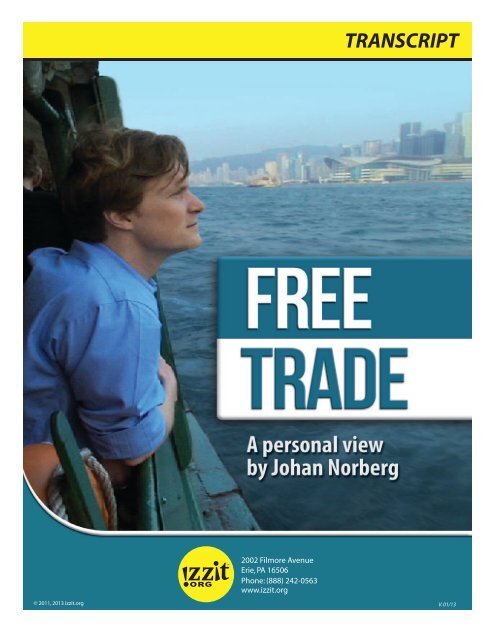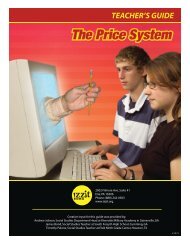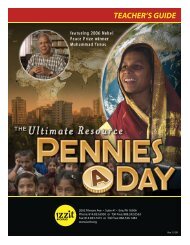Transcript - Izzit.org
Transcript - Izzit.org
Transcript - Izzit.org
You also want an ePaper? Increase the reach of your titles
YUMPU automatically turns print PDFs into web optimized ePapers that Google loves.
TRANSCRIPT2002 Filmore AvenueErie, PA 16506Phone: (888) 242-0563www.izzit.<strong>org</strong>© 2011, 2013 izzit.<strong>org</strong>V. 01/13
PART TWO: CREATIVE DESTRUCTIONJOHAN NORBERG: We have a choice of Smart Phones, tomatoes, even trucksbecauseof competition. Sometimes the price is too high, sometimes the product doesn’twork, and sometimes the service is lousy. But in that case, someone else can enter themarket and take all the customers. So every company has to offer us something better tostay in business. Some succeed, but some fail, and it’s that risk of failure that reallyscares us.MILTON FRIEDMAN: When a businessman faces trouble, a market threatens todisappear, or a new competitor arises, there are two things he can do. He can turn to thegovernment for a tariff or a quota, or some other restriction on competition, or he canadjust and adapt.In Hong Kong, the first option is closed. Hong Kong is too dependent on foreign trade, sothat the government has simply had to adopt a policy of complete non-interference. That'stough on some individuals, but it’s extremely healthy for the society as a whole.Only the businessmen who can adapt, who are flexible and adjustable survive, and theycreate good employment opportunities for the rest.NORBERG: So this the kind of boxes that you were producing here when MiltonFriedman came by to visit?FRIEDMAN: Mr. Cheung makes metal containers. Nobody has ordered him to. Hedoes it because he has found that he can do better for himself that way, than by makinganything else. But if demand for metal containers went down, Mr. Cheung would soonget that message.NORBERG: And Mr. Cheung is still here, and nowadays he produces more things forthe tourist trade.But, when only the flexible and adaptable survive…thank you, Mr. Cheung, it means thatother businesses fail. Economists call this constant renewal of the economy, “creativedestruction.” If we want to increase our wealth and opportunities; we have to stop doingold things in old ways, and start doing innovative things in better ways. In other words,we have to be, “creative.”But when consumers move on to new goods, it can be difficult and painful, because oldfactories and old shops close, and people lose their jobs. That is the, “destructive” part.And yet, most economists think that creative destruction is necessary for economicdevelopment.Mrs. Lee starts out every day with her lunch, her teapot and her cell phone.5
Cell phones are important for boat drivers around here, because they used to passmessages by shouting to one another. Not terribly efficient, and very bad for your voice.Hong Kong has the most cell phones in the world. One-point-seven cell phones perperson. But all around the globe, we’ve seen a cell phone revolution. In 1980, therewere eleven-million cell phones on the planet. Today almost four-billion people haveaccess to cell phones.This is an example of creative destruction. It used to be all landlines, made of copper.But now they’ve become less and less important, especially in the developing world.This farmer in Bangladesh was always dependent on one buyer of her eggs, and had toaccept his prices. But now she can now check the price of eggs in other village marketswith her cell phone, before she sells, and so she can negotiate a better price.In Tanzania, it used to be that the customer often had to sit and wait for hours at thebutcher’s for the meat to arrive. And sometimes in Peru, the meat had to wait, becausethe customers didn’t know that it was already there. Today, you coordinate the businesswith a cell phone, and the food ends up in people’s stomachs, and not in the garbage.We have rarely seen a technology that has meant so much for human development. Butthat was not the intention. The telecom companies wanted more market share, those whoadapted and distributed the technology locally wanted to make money, and butchers andegg farmers just wanted to improve their own lives.Adam Smith would say that it was as if they were led by an invisible hand, when theyrolled out this technology faster than any technology in world history. And many wouldsay that this revolution did more to give the average person power, and to reduce povertymore than any government program.But all progress comes at a cost. Market forces are both creative and destructive. Aspeople buy cell phones, they ditch their home phones. And then, there is no need for allthose workers who used to connect homes to wires, and repair telephone lines.And that is tens of thousands of people who worked hard, and supported their families,and through no fault of their own-lost their jobs, and whose skills might not be in demandas the technology takes a new leap.Some succeed in inventing the next Smart Phone, and become incredibly rich. Others arestuck with an obsolete technology. Some win, some lose, and the result is something thatmost people have a problem with: inequality.Here in the United States, you’ve accepted more inequality of outcome. But the economyis not a zero-sum game. In other words, we’re not fighting over ever-smaller pieces ofthe pie.6
The pie is constantly growing larger, as people and businesses become more productive.And the world is getting wealthier all the time. In the last one-hundred years withrelatively free markets, we have created more wealth than in the one-hundred-thousandyears before. And as a result, we have reduced extreme poverty around the world; morethan people ever dreamed was possible.Twenty-five years ago, you had to work for four-hundred-and-fifty-six hours to be able tobuy a cell phone. Today, after all the productivity increases that businesses andinnovators have introduced, you only have to work for four hours. And of course, it’s abetter deal today. This is not just a phone; it also doubles as a texting device, a calendar, acamera, almost everything.In these same twenty-five years, the cost of a personal computer has been reduced fromfour-hundred-and-thirty-five hours, to twenty-five hours. And you really couldn’tcompare it to those original PCs, that wouldn’t be able to run any of the software, or theoperating systems that we use today.People with a lot of money can afford to be early adopters, they can pay ridiculousamounts for the first versions of cell phones and personal computers, and that’s a goodthing for us. Because they create bigger markets, so the companies get revenue, so thatthey can streamline production and create lower-cost versions, so that all of us can buyone.And historically, this seems to be the case. Free markets regularly turn luxuries intoconsumer goods. This may seem hard to believe, but the average rate of ownershipfor refrigerators, air conditioners, and dishwashers are higher among poor Americanhouseholds today, than then they were for all American households in the early 1970s.FRIEDMAN: When people are free, they are able to use their own resources mosteffectively and you will have a great deal of productivity, a great deal of opportunity.The major beneficiaries are always the small man. The man who has power who is at thetop of society, he's going to do well whatever kind of society you have. It is the societywhich gives the small man the opportunity to go his way, which is going to benefit himthe most.For a list of additional resources to use with this video go towww.izzit.<strong>org</strong>/products and click on the Free Trade video.7
We are very interested to learnhow you use our material. Pleaseshare your experiences or lessonplan ideas by visiting usat www.izzit.<strong>org</strong>.2002 Filmore AvenueErie, PA 16506Phone: (888) 242-0563www.izzit.<strong>org</strong>

















